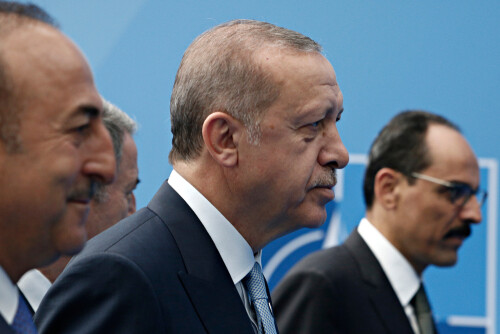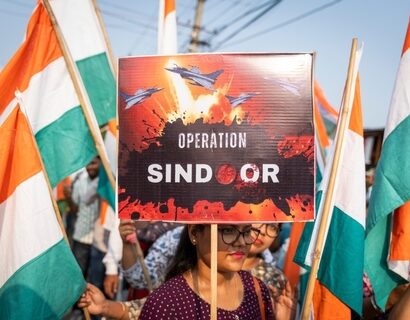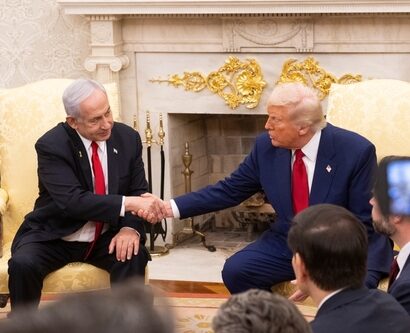Abstract: Türkiye’s geopolitical stance is evolving, particularly due to its embrace of Neo-Ottomanism. It potentially causes repercussions within the NATO alliance and could affect the Balkans. Several symbolic actions, like the reconversion of Hagia Sophia, Türkiye’s reluctance towards Sweden’s NATO application, and Erdogan’s nationalist rhetoric, seem to signify a pivot towards Neo-Ottomanism.
Problem statement: How could Türkiye’s shift from secularism to Neo-Ottomanism cause emerging challenges within NATO as well as potential disruptions to regional stability in the Balkans?
So what?: International organisations such as NATO and regional stakeholders should actively engage Türkiye in open and transparent discussions regarding its geopolitical aspirations and the implications for regional stability. In addition to engaging with NATO and Türkiye, Balkan states should prioritise multilateral dialogue and cooperation to preserve regional stability and territorial integrity. This entails strengthening regional alliances, fostering diplomatic channels, and promoting dialogue mechanisms to address potential challenges stemming from Türkiye’s evolving geopolitical stance.

From Secularism to Neo-Ottomanism
Türkiye was reluctant to ratify Sweden’s application to join the NATO strategic alliance for months. While Erdoğan’s pursuit of advanced weaponry from the U.S. is often interpreted as a primary motive, it is likely driven by Türkiye’s broader geopolitical ambitions, particularly in reviving its historical Ottoman influence in the Balkans. Erdogan’s increasingly assertive rhetoric supports this inference.[1]
Neo-Ottomanism is a political ideology that envisions Türkiye’s return to Islam as its official state doctrine, with territorial claims to regions once part of the Ottoman Empire. First mentioned in 1985 by David Barchard, Neo-Ottomanism seeks to abolish Kemalism and directly challenges the pillars of modern and secular Türkiye.[2]
Neo-Ottomanism is a political ideology that envisions Türkiye’s return to Islam as its official state doctrine, with territorial claims to regions once part of the Ottoman Empire.
In 2020, Türkiye reconverted Hagia Sophia, a UNESCO world heritage site, from a museum to a mosque. This mirrored the historical transformation in 1453 when the Christian cathedral was turned into a mosque, signalling the decline of Christianity and the spread of Islam in Europe through the Balkans.[3] The subsequent decision to convert it into a museum during Mustafa Kemal Atatürk’s presidency symbolised the shift to secularism; its latest change of use signals the shift from secularism to Neo-Ottomanism.
Ahmet Davutoğlu, former right-hand man of Erdoğan and Turkish Prime Minister from 2014 to 2016, argued in his book Strategic Depth that the primary goal of Neo-Ottomanism is a return to the Balkans. According to Davutoğlu, the Ottoman Empire was a successful state that exhibited tolerance toward different religions and, as such, should be revived for the well-being of all nations in the Balkans.[4] While Noam Chomsky claims that Türkiye is creating an Islamic Caliphate,[5] Neo-Ottomans identify themselves with the tolerant, multicultural aspect of the Ottoman Empire.
However, this perspective is a romanticised view of reality, given it overlooks the many atrocities perpetrated on the Christian population during the Ottoman Empire.
A Turkish Commonwealth?
Erdoğan has consistently demonstrated a strong nationalistic and Neo-Ottoman stance. This was particularly noticeable during his 2022 election campaign in Konya, where he praised the Ottoman Empire in his speech, suggesting a revival of Türkiye’s historical greatness. This asserts that Davutoğlu’s foreign policy ideas remain integral to Erdogan’s agenda. The most realistic vision for establishing a ‘Neo-Ottoman State’ involves the formation of a Turkish Commonwealth of Nations.[6]
Davutoğlu wants Türkiye’s expansionary policy to focus on multiple countries. The first level comprises Kosovo, Albania, North Macedonia, and Sandžak-the Ottoman-era district in Serbia with a Muslim majority. The second level extends to the rest of Serbia, Bosnia and Herzegovina, Bulgarian Thrace, and parts of Greece.[7]
The Ottoman Empire dominated the Balkans for five hundred years until the early 20th century, leaving lasting influences not only politically and economically but also culturally and linguistically. Türkiye’s soft power has surged across the Balkans in the past decade, notably through popular TV shows like “Suleiman the Magnificent.”. These shows/forms of media, in their glorification of the Ottoman Empire, particularly resonate with Muslim populations.[8]
The Ottoman Empire dominated the Balkans for five hundred years until the early 20th century, leaving lasting influences not only politically and economically but also culturally and linguistically.
Ahmet Davutoğlu sees Muslim populations in the Balkans, mainly Albanians and Bosniaks, as the main pillars of Neo-Ottomanism. Consequently, Türkiye has done everything in its power to grow the number of states that recognise the independence of Kosovo and continues to play a big role through its significant economic activity in the rest of the Balkans. It shouldn’t be surprising that Albanians and Bosnian Muslims widely celebrated Erdoğan’s presidential victory.[9]
NATO and the Balkans
Türkiye is also militarily present in the Balkans within NATO’s force in Kosovo, under UN Security Council resolution 1244, with an estimated 1,000 Turkish soldiers out of a total of 4,800 NATO soldiers. Most of them are stationed in the military camp symbolically named “Sultan Murat”, after the Ottoman ruler who led the Ottomans in the conquest of Europe and was killed in the battle of Kosovo in 1389. Because of the immense cultural and historical importance that the epics of this battle have played in the formation of the modern Serbian identity, this name is regarded as a provocation by the Serbs.[10]
NATO’s stated mission is to ensure collective defence for its members through both political and, mainly, military measures. This was a very attractive option for all the Balkan nations, considering the region’s historical proneness to conflicts and crises, which resulted in almost all Balkan nations becoming members of the alliance. However, suppose the alliance comes to a point where it eventually struggles to maintain peace and stability among its own members. In that case, it can, in the worst case, completely delegitimise the organisation and draw the entire region into a political crisis. This was evident as tensions rose between Türkiye and Greece surrounding the areas of gas-rich waters in the Eastern Mediterranean.[11] This raises the question of whether NATO can effectively contain Türkiye’s expansion, especially since most Balkan nations are its members.
During the Ottoman Empire, Tsarist Russia was a natural ally to all occupied orthodox nations in the Balkans, which saw it as their patron, especially during the Russo-Turkish wars. At the height of the conflict between the Ottoman Empire and Tsarist Russia, Russia reached out to Balkan nations embroiled in conflict with the Ottomans, offering both financial and military assistance. This assistance would subsequently diminish as the war reached a stalemate. This indicates that the Russian strategic interests in the Balkans have varied over the centuries, and with it, the assistance it was willing to give to the Balkan nations.
During the Ottoman Empire, Tsarist Russia was a natural ally to all occupied orthodox nations in the Balkans.
In 2003, Russia withdrew its soldiers from Kosovo and Bosnia and Herzegovina, the premise being that it had no strategic interests in the Balkans.[12] Presently, Russia’s strategic interests in the Balkans remain ambiguous. Russia maintains a political interest in preserving strong and close relations with countries like Serbia and Bosnia and Herzegovina, which have not imposed sanctions against it. However, as the war in Ukraine progresses, it is unclear whether Russia can stop the expansion of Türkiye in the Balkans, even if it has a strategic interest in doing so.
Türkiye and Russia
The geopolitics of the situation is uncertain. Despite the success of Türkiye’s efficient Bayraktar drones in Ukrainian offensives against Russia, a significant strategic relationship with Russia persists. Türkiye has not only delayed Sweden’s accession into NATO but also blocked NATO troops from entering the Black Sea and has increased bilateral trade with Russia despite sanctions.
While attempting but failing to host peace negotiations between Ukraine and Russia, Türkiye has brokered negotiations for grain exports across the Black Sea. Russia and Türkiye have agreed on the “TurkStream”, Russia’s Southern Pipeline to Europe, with Türkiye taking over the benefits of “Gazprom” from Germany. Additionally, Türkiye has established its first nuclear power plant with Russian assistance.[13]
Russia and Türkiye have agreed on the “TurkStream”, Russia’s Southern Pipeline to Europe, with Türkiye taking over the benefits of “Gazprom” from Germany.
Türkiye’s unmanaged behaviour within NATO seems to be fueled by its broader geopolitical aspirations in the Balkans. Its strategic partnership with Russia may very well be a part of Russia’s strategy to delegitimise NATO.
Whatever the case, Türkiye’s aspirations and means of achieving them could certainly be to the detriment of Balkan nations, which have struggled throughout their history to achieve peace and stability. As geopolitical tides change, the age-old question persists: Can the Balkan nations be left out of the chess games played by more powerful nations, or will they be drawn into them once again?
Nemanja Plotan specialises in International Political Economy, International Politics, History and Politics of the Balkans, Monetary Policy; International Relations and Political Economy. The views contained in this article are the author’s alone and do not represent the views of GEA CEE GmbH.
[1] Huseyin Hayatsever, Tuvan Gumrukcu, “Türkiye approves Sweden’s NATO membership bid after 20-month delay,” Reuters, January 24, 2024, https://www.reuters.com/world/Türkiye-set-approve-swedens-nato-membership-bid-after-long-delay-2024-01-23/.
[2] David Barchard, “Türkiye and the West,” Royal Institute of International Affairs [Published for] the Royal Institute of International Affairs [by] Routledge & Kegan Paul (1985).
[3] Daren Butler, Ece Toksabay, “Erdogan declares Hagia Sophia a mosque after Turkish court ruling,” Reuters, July 10, 2020, https://www.reuters.com/article/idUSKBN24B1TH/.
[4] Ahmet Davutoglu, “Strategic depth: Türkiye’s international position,” Athens, Quality Publications (2010); Tüysüzoğlu Göktürk, “Strategic depth: A neo-Ottomanist interpretation of Turkish Eurasianism,” Mediterranean Quarterly 25, no. 2 (2014): 85-104.
[5] “Erdogan is trying to create something like Ottoman Caliphate,” Noam Chomsky on Artsakh issue, Armenpress, October 11, 2020, https://armenpress.am/eng/news/1031248/%E2%80%98erdogan-is-trying-to-create-something-like-ottoman-caliphate%E2%80%99-%E2%80%93-noam-chomsky-on-artsakh-issue.htm.
[6] Ahmet Davutoglu, “Strategic depth: Türkiye’s international position,” Athens, Quality Publications (2010); Tüysüzoğlu Göktürk, “Strategic depth: A neo-Ottomanist interpretation of Turkish Eurasianism,” Mediterranean Quarterly 25, no. 2 (2014): 85-104.
[7] Idem.
[8] Jana Jabbour, “Turkish Soap Operas: Soft Power at the Service of a Rising Power’s Political Ambitions.”
[9] Hamdi Firat Buyuk, “Erdogan Election Victory in Türkiye Celebrated Across Balkans,” BalkanInsight, May 29, 2023, https://balkaninsight.com/2023/05/29/erdogan-election-victory-in-turkey-celebrated-across-balkans/
[10] “Turkish forces arrive in Kosovo to bolster NATO-led peacekeepers after recent violence,” AP News, June 05, 2023,https://apnews.com/article/Türkiye-kosovo-nato-kfor-serbs-469d7686a5f6cdeec3a2a307a847b9b2.
[11] Romain Brunet, “Troubled waters: Greek-Turkish escalations in the Mediterranean,” France24, August 28, 2020, https://www.france24.com/en/20200828-troubled-waters-greek-turkish-escalations-in-the-mediterranean.
[12] Steve Gutterman, “Russia to Withdraw Balkan Peacekeepers,” Midland Daily News, April 08, 2003, https://www.ourmidland.com/news/article/Russia-to-Withdraw-Balkan-Peacekeepers-7140494.php.
[13] Gabriel Gavin, “Russia and Türkiye vie over Black Sea, as Erdoğan prepares to visit Putin,” Politico, August 30, 2023, https://www.politico.eu/article/black-sea-russia-Türkiye-ukraine-war/; Vladimir Afanasiev, “Upstream, Russia makes huge gas concession to Türkiye,” May 17, 2023, https://www.upstreamonline.com/politics/russia-makes-huge-gas-concession-to-Türkiye/2-1-1449161; “Erdogan thanks Putin for his help on Turkish nuclear plant,” Al Jazeera, April 27, 2023, https://www.aljazeera.com/news/2023/4/27/putin-erdogan-speak-before-inauguration-of-turkish-nuclear-plant; Peter Kenyon, Kaitlyn Radde, “Russia agrees to extend the Ukraine grain deal again,” npr, March 18, 2023, https://www.npr.org/2023/03/18/1164538947/russia-ukraine-grain-deal-extended.




